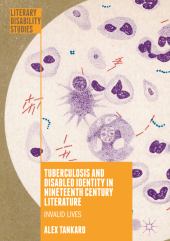 Neuerscheinungen 2018Stand: 2020-02-01 |
Schnellsuche
ISBN/Stichwort/Autor
|
Herderstraße 10
10625 Berlin
Tel.: 030 315 714 16
Fax 030 315 714 14
info@buchspektrum.de |

Alex Tankard
Tuberculosis and Disabled Identity in Nineteenth Century Literature
Invalid Lives
1st ed. 2018. 2018. ix, 238 S. 210 mm
Verlag/Jahr: SPRINGER, BERLIN; SPRINGER INTERNATIONAL PUBLISHING 2018
ISBN: 3-319-71445-7 (3319714457)
Neue ISBN: 978-3-319-71445-5 (9783319714455)
Preis und Lieferzeit: Bitte klicken
Until the nineteenth century, consumptives were depicted as sensitive, angelic beings whose purpose was to die beautifully and set an example of pious suffering - while, in reality, many people with tuberculosis faced unemployment, destitution, and an unlovely death in the workhouse. Focusing on the period 1821-1912, in which modern ideas about disease, disability, and eugenics emerged to challenge Romanticism and sentimentality, Invalid Lives examines representations of nineteenth-century consumptives as disabled people. Letters, self-help books, eugenic propaganda, and press interviews with consumptive artists suggest that people with tuberculosis were disabled as much by oppressive social structures and cultural stereotypes as by the illness itself. Invalid Lives asks whether disruptive consumptive characters in Wuthering Heights , Jude the Obscure , The Idiot , and Beatrice Harraden´s 1893 New Woman novel Ships That Pass in the Night represented critical, politicised models of disabled identity (and disabled masculinity) decades before the modern disability movement.
1. Introduction. 2. Medical and Social Influences on Consumptive Identity. 3. Victimhood and Death: Consumptive Stereotypes in Fiction and Nonfiction. 4. ´I hate everybody!´: The Unnatural Consumptive in Wuthering Heights .- 5. ´Too much misery in the world´: Protest in Jude the Obscure (1895) and Ippolit´s ´Necessary Explanation´ in The Idiot (1869).- 6. Progress: Valid Invalid Identity in Ships that Pass in the Night (1893).- 7. Conclusion.
"Tuberculosis and Disabled Identity is an intensely informative text, which puts forward challenging and nuanced theories and readings while still remaining accessible to the reader. It offers a new and exciting perspective on nineteenth century fiction which engages with the literary tradition of depicting the ´consumptive´, and does so in a fascinating, thought-provoking, and enlightening way." (Emily Jessica Turner, The British Society for Literature and Science, bsls.ac.uk, October 30, 2018)
Alex Tankard lectures in English Literature at the University of Chester, UK. She has published essays on Aubrey Beardsley and Doc Holliday and tuberculosis; this is her first book.


